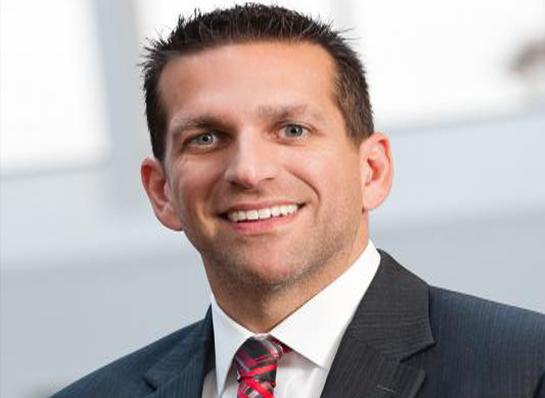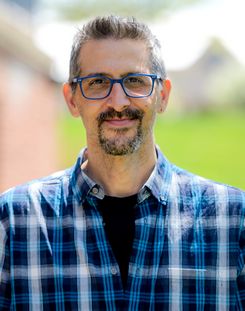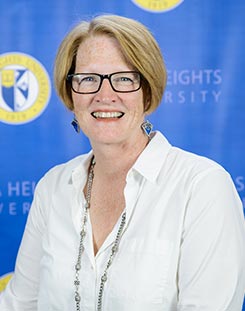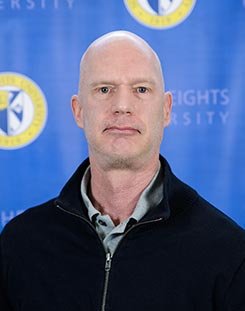30
Total Credits
10
Total Classes
Online
Format
Turn your qualified AAS or professional training into a bachelor’s degree with a Bachelor of Applied Science program for professionals in the following career fields:
- Allied health
- Public safety
- Technical/industrial fields
- Specialized occupations
Text Message Opt-in Policy

David Messer, Deputy Warden at Gus Harrison Correctional Facility in Adrian, Mich., received his Bachelor of Applied Science degree from Siena Heights University’s online program.
The Bachelor of Applied Science degree (BAS) is a career-oriented degree for professionals with allied health, public safety, technical/industrial, and/or specialized occupational backgrounds. The BAS Degree is structured on an individually designed academic program around the major-related learning you have already achieved.
Each Bachelor of Applied Science student develops a customized degree plan appropriate to their education and future career goals. Undergraduate coursework and curriculum include classes in management, communications, behavioral science, and other disciplines relevant to your career. You will develop your leadership and decision-making skills as well as clarify your individual goals.
Finish your degree in a time frame that works with your schedule – in as little as 12 months, depending on your remaining requirements and availability.
College + Credentials = You’re Closer to a Degree than You Think!
We accept credit for previous college work. We accept credit for certifications. We accept credit for work experience and licensures. We work with you to uncover every possible source of transfer credit that you have earned. And we accept up to 90 hours of transfer credit — leaving you to finance as few as 30 hours (10 classes) of your 120-credit-hour program—all to save you time and money. When we say you’re closer to completing your affordable degree than you think, we mean it.
Credit may be awarded for course work completed at accredited colleges and universities as well as approved technical, trade and allied health schools, and/or for professional experience, licensure, or college-equivalent prior learning. Options for earning prior learning credit include CLEP (College-Level Examination Program), Excelsior College Exams, Michigan Occupational Competency Assessment Exams (MOCAC), ACEPONSI (American Council on Education Program on Non-Collegiate Sponsored Instruction), military and police academy certification, among other testing programs. Transfer credit is determined individually; interested students should contact an admissions representative.
Prepare for a Lifetime of Career Success
A BAS program from Siena Heights University has a lot to offer, including:
- One-on-one advising.
- A faculty of high-quality instructors, experts in their fields.
- 100% online program flexibility—attend anytime, anywhere.
- 7-week terms and six class start dates.
- Accelerated completion—finish in as little as 12 months.
- Small, personalized classes.



To pursue this degree, you need to have:
- A qualifying Associate of Applied Science (AAS) degree in one of the pathways listed below from an accredited institution.
OR - A completed and approved training program with two or more years of work experience in a related field. See your admissions representative for more information.
Approved AAS/Professional Transfer Pathways
Health Care Professions: For persons trained in Radiologic Technology, Respiratory Therapy, Radiation Therapy, Dental Hygiene, Surgical Technology, Diagnostic Medical Sonography, Health Information Technology, Massage Therapy, Nuclear Medicine Technology, Medical Assisting, Medical Laboratory Technology, Nuclear Medicine Technology, Neurodiagnostic Technology, Physical Therapy Assisting, or Health Studies
Public Safety Professions: For persons trained in Law Enforcement, Fire Technology, Paramedic Technology, EMT, Corrections or Public Safety Studies.
Technical/Trade and Occupational Professions: For persons trained in Aviation, Aviation Maintenance Technology, Automotive Technology, Climate Control Technology, Drafting and Design Technology, Electronics Technology, Industrial Technology, Nuclear Technology, Air Frame & Power Plant Technology, Energy Technology, Skilled Trades, or General Technology
Specialized Occupational Professions: For persons trained in Sign Language Interpreting, Administrative Office Systems, Computer and Information Systems Technology, Computer Aided Drafting & Design Technology, Culinary Arts, Media Technology, Paralegal Studies, Veterinary Technology, or Occupational Studies.
For forty years we have been assisting working professionals pursue their educational goals. We are well-versed in assessing transfer credit from both traditional and non-traditional sources. Our student retention and graduation rates exceed industry standards.
A recent student satisfaction survey of BAS graduates cited the ease of credit transfer and advancing career opportunities as primary reasons why they enrolled in the BAS degree program at Siena Heights. Over 95% of BAS graduates surveyed, would choose Siena again for their BAS degree.
A majority of those surveyed indicated one of these four career outcomes occurred upon finishing their BAS degree:
- Received a promotion.
- Obtained a new job at another company.
- Significantly increased their earnings; or
- Made a change to a new industry/sector.
Examples of the impact of a BAS degree on our graduates lives include:
- Radiologic Technologists promoted to manager.
- Police Officer promoted to Chief.
- Massage Therapist—first in family to earn a bachelor’s degree.
- Surgical Technologist that became program director for a community college.
- Graduates accepted into master’s program.
Costs & Aid
We know that college can be expensive, but we don’t want cost to keep you from attending Siena Heights University! We offer numerous financial aid opportunities. Federal aid is available to students who qualify by completing the FAFSA. Feel free to contact us with questions about financial aid opportunities, or click on one of the links below.
Interested in Siena Heights University?
Visit
Experience Siena Heights by touring the Adrian campus and meeting the people who make up our dynamic community.
Questions? Let’s Talk.
We’d love to get to know you and answer any questions you may have.

